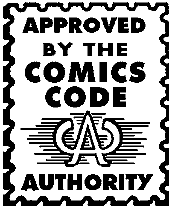 Back in 1954, comic book publishers were in a lot of trouble. Parents, child psychologists, and the Senate Sub-Committee on Juvenile Delinquency were outraged at the graphic sex and violence depicted in the pages of titles like Murderous Gangsters, Clutching Hand, Lawbreakers, Worlds of Fear et al, especially as so many of them seemed to be aimed at children. So, fearful of legislation, the comic book publishers got together and agreed a Code of Conduct, sanitizing their output practically overnight. They based their restrictions on the Hays Code (which was beginning to lose its hold over movie studio output), and declared:
Back in 1954, comic book publishers were in a lot of trouble. Parents, child psychologists, and the Senate Sub-Committee on Juvenile Delinquency were outraged at the graphic sex and violence depicted in the pages of titles like Murderous Gangsters, Clutching Hand, Lawbreakers, Worlds of Fear et al, especially as so many of them seemed to be aimed at children. So, fearful of legislation, the comic book publishers got together and agreed a Code of Conduct, sanitizing their output practically overnight. They based their restrictions on the Hays Code (which was beginning to lose its hold over movie studio output), and declared:
- Criminals shall not be presented so as to be rendered glamorous or to occupy a position which creates the desire for emulation.
- In every instance good shall triumph over evil and the criminal punished for his misdeeds.
- Scenes of excessive violence shall be prohibited. Scenes of brutal torture, excessive and unnecessary knife and gun play, physical agony, gory and gruesome crime shall be eliminated.
- All scenes of horror, excessive bloodshed, gory or gruesome crimes, depravity, lust, sadism, masochism shall not be permitted.
- Scenes dealing with, or instruments associated with walking dead, torture, vampires and vampirism, ghouls, cannibalism and werewolfism are prohibited.
(Read the full list at Comic Artville)
No zombies or pimp daddies, in other words. EC Comics (publisher of Crime SuspenStories, Frontline Combat, Crypt of Terror and The Haunt of Fear) was the most badly hit, and had only one title (Mad magazine) left within a year. The Code was fairly rigidly enforced until the 1980s, when DC and Marvel started publishing comics that were aimed specifically at adults, and didn’t need the Code seal on the front cover. Other publishers followed suit. Marvel came up with its own rating system in 2001, and, on January 20th, DC Comics stated they will no longer carry the seal either. That left only Archie Comics (publisher of very tame titles) to announce that they will be abandoning the Code at the end of February.
So, farewell then, Comics Code. It seems that more and more censorship structures will be abandoned as anomalies of the twentieth century, as the global, instant, and instantly replicating nature of the internet makes policing popular culture an impossibility.
Check out some Pre-Code Comic Nastiness here – from My Retrospace and some of the juiciest horror stories as kindly scanned in at The Horrors of It All
